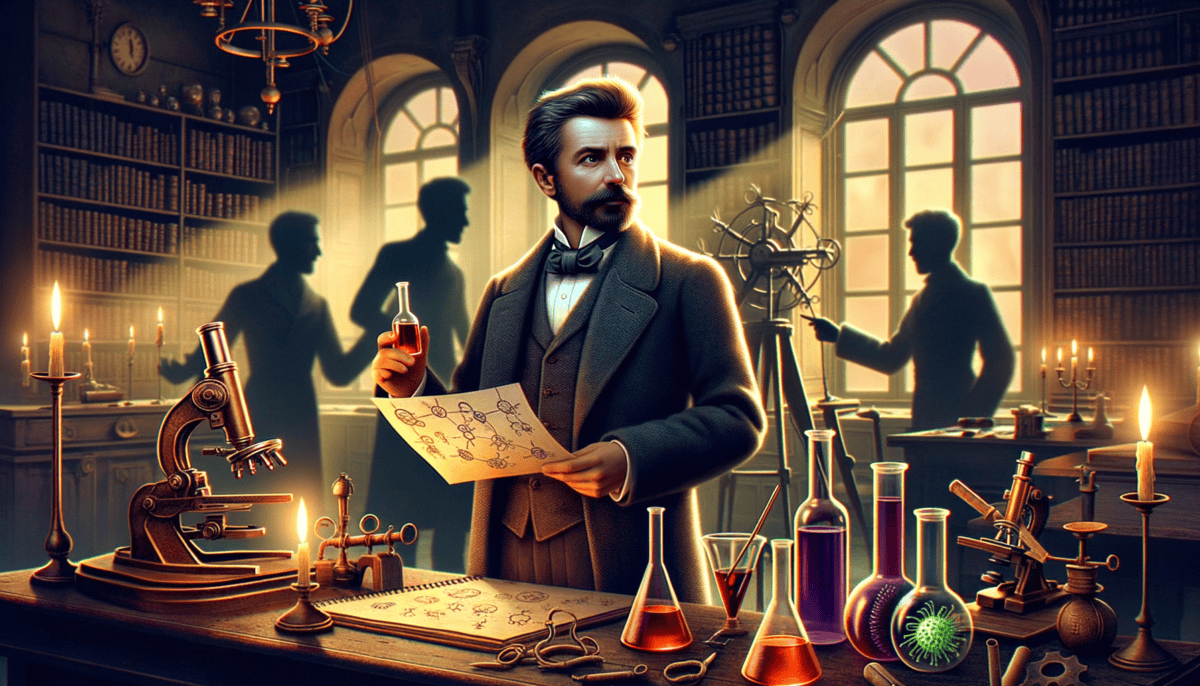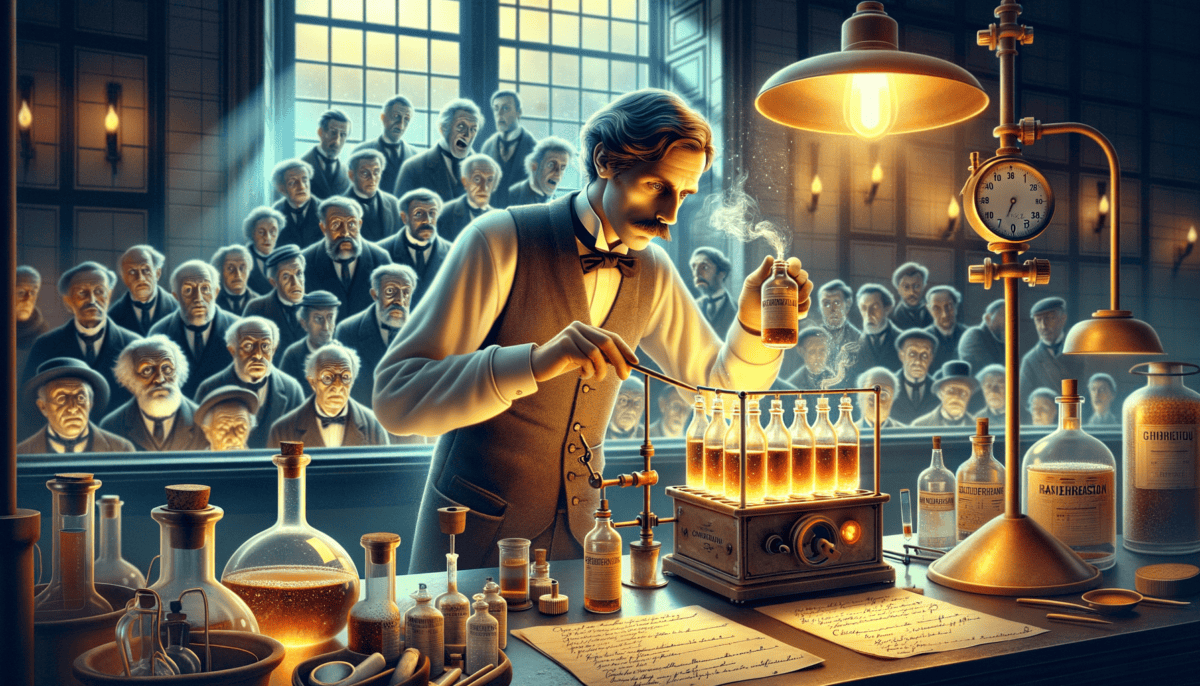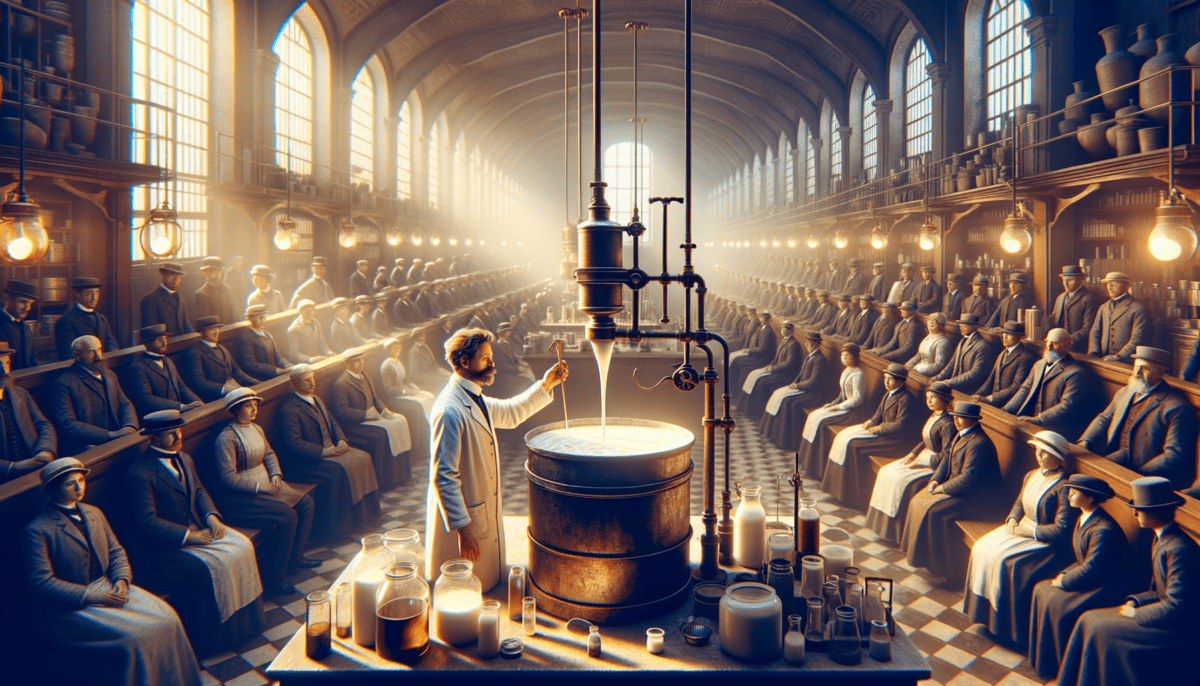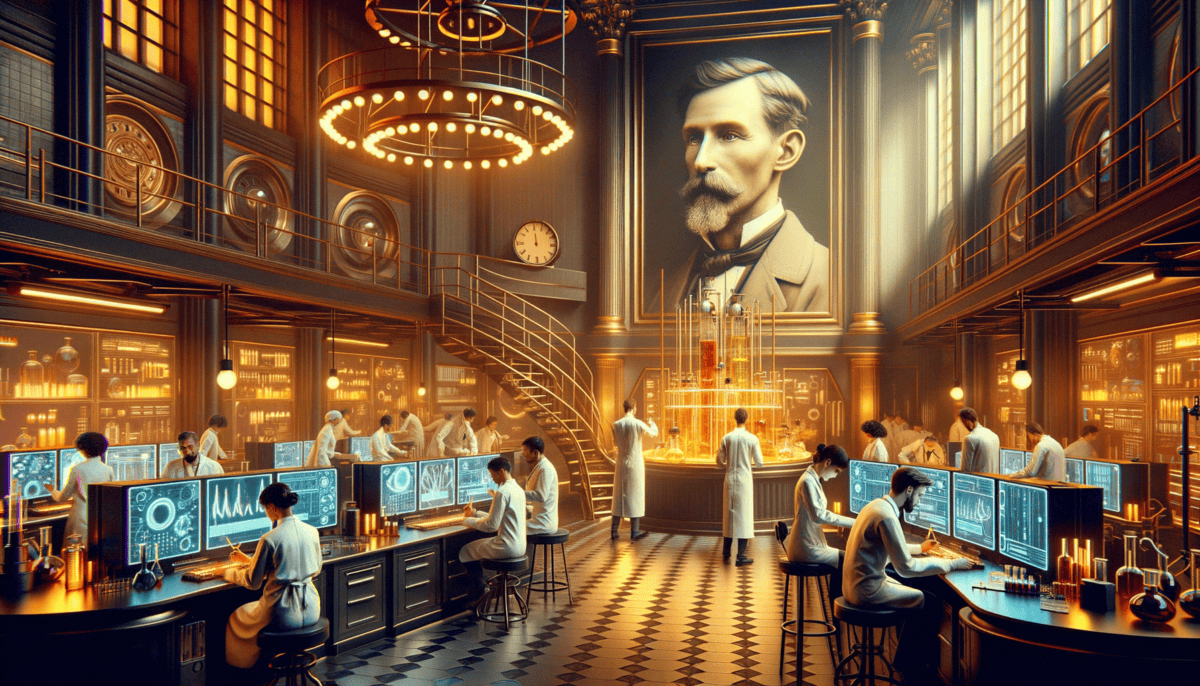A Curious Boy in Arbois
The warm sun peeked through the windows of a small house in Arbois, France. Inside, a young boy named Louis Pasteur sat at his wooden desk, his eyes wide with wonder.
"Louis, what are you drawing today?" his mother asked, peering over his shoulder.
"Look, Mama! I'm drawing the crystals I saw in Papa's tannery," Louis replied excitedly, showing her his detailed sketches.
Louis wasn't like other children in his small town. While they played in the streets, he spent hours watching his father work with leather in the family tannery. The strange smells and changes in the leather made him want to know why things happened the way they did.
“Why does food go bad?” Louis would often ask. “And why does milk turn sour?”
His teachers noticed something special about him too. Though he wasn't always the best student, Louis had a way of looking at things differently. He wanted to understand everything he saw.
One day, during dinner, Louis noticed something strange about their milk. Some bottles went bad quickly, while others stayed fresh longer. He couldn't stop thinking about it.
"Papa," he said, pushing his dark hair from his eyes, "why do some things spoil faster than others?"
His father smiled. "That's just the way things are, son."
But Louis wasn't satisfied with that answer. He started keeping a small notebook where he wrote down his observations:
• Things that made milk go bad faster:
- Warm weather
- Leaving it out too long
- Dirty containers
- Strange smells
At school, Louis's science teacher, Mr. Bernard, noticed his curiosity. "Louis," he said one day after class, "questions like yours are what lead to great discoveries."
Those words stuck with Louis. He began spending more time in the school's small laboratory, watching chemical reactions and learning about the natural world.
"Maybe someday," Louis thought to himself, "I'll find out why things spoil. Maybe I can even find a way to stop it!"
His classmates sometimes teased him for asking so many questions, but Louis didn't mind. He knew that understanding these mysteries was important.
One evening, as Louis watched his mother preserve fruits for winter, another question popped into his mind. "Mama, why do we heat the fruit before storing it?"
"It keeps it from spoiling, dear," she answered, stirring the hot mixture.
Louis wrote this down in his notebook too. He didn't know it yet, but these simple observations would one day lead him to one of the most important discoveries in history.
The sun was setting over Arbois, and young Louis Pasteur sat by his window, dreaming of all the mysteries he would solve. He didn't know that his curious mind would one day save millions of lives, but he knew one thing for sure – he would never stop asking questions.
"Tomorrow," he whispered to himself, "I'll try my own experiment." His eyes sparkled with excitement as he planned his next investigation, ready to uncover more secrets about the world around him.
The Path to Discovery
Years had passed, and Louis Pasteur was no longer the curious boy from Arbois. Now a young scientist at the University of Paris, he walked through the crowded laboratory, his footsteps echoing against the stone floors.
“Professor Pasteur, you can’t seriously believe these invisible creatures exist!” Professor Durant scoffed, adjusting his spectacles.
Louis smiled patiently. “Look here,” he said, pointing to his microscope. “These tiny living things are everywhere, even if we can’t see them with our eyes alone.”
His workspace was filled with bottles of wine from local vintners who were having trouble with their products spoiling. The wine industry was important in France, and bad wine meant lost money and unhappy customers.
“Something is making the wine turn sour,” Louis explained to his assistant, Marie. “And I believe these microscopic beings are the cause.”
He spent long hours studying drops of wine under his microscope, making careful notes about what he saw:
- Clear wine had very few microorganisms
- Spoiled wine was full of tiny moving creatures
- Heat seemed to stop the spoiling
- Clean containers kept wine fresh longer
Many other scientists laughed at his ideas. “Wine spoils because that’s what wine does!” they would say. But Louis remembered what his teacher Mr. Bernard had told him years ago about questions leading to discoveries.
One evening, while working late in his laboratory, Louis made an exciting observation. “Marie!” he called out. “Look at this wine sample we heated yesterday!”
Marie hurried over. “What is it, Professor?”
“The harmful microorganisms – they’re gone! The heat killed them, but the wine still tastes the same!” His eyes sparkled with excitement, just like they did when he was a boy.
“But Professor,” Marie said thoughtfully, “if this works for wine, could it work for other things too? Like milk?”
Louis’s face lit up. He remembered watching milk spoil in his childhood home. “Marie, you’re absolutely right! We must try this with different foods and drinks!”
The next few weeks were filled with experiments. Louis and his team carefully heated different liquids, studying how the microorganisms responded. Some of his fellow scientists still doubted him, but Louis knew he was onto something important.
“You see,” he explained to a group of visiting scientists, “these microorganisms are like tiny invisible workers. Some help make cheese and bread, but others can make us sick. By heating things carefully, we can stop the bad ones while keeping the good ones.”
Word of his experiments began to spread through Paris. Some wine makers started trying his heating method, and to their surprise, their wine stayed fresh longer! But Louis knew this was just the beginning.
As he walked home that evening, Louis thought about all the people who got sick from spoiled food and drink. “We’re getting closer,” he whispered to himself, clutching his notebook of observations. “Soon we’ll find a way to make food safer for everyone.”
The stars twinkled above Paris as Louis planned his next experiments. He didn’t know it yet, but his work was about to change the world in ways he could never imagine.
A Test of Heat and Faith
The morning sun streamed through the tall windows of Louis Pasteur’s laboratory, casting long shadows across tables filled with bottles of milk and wine. Today was special – it was time to prove his heating method could work!
“Are you ready, Marie?” Louis asked, adjusting the flame under a large pot. His faithful assistant nodded, holding her notebook tight.
“First, let’s test the milk,” Louis said, carefully pouring fresh milk into several clean bottles. He had learned that milk spoiled very quickly, especially in warm weather.
“Remember,” he told Marie, “we must heat it just right – not too hot, not too cold. Like finding the perfect temperature for a bath!”
They worked carefully, heating some bottles while leaving others untouched. Louis used his special thermometer to check the temperature. “58 degrees Celsius,” he muttered, making notes. “Perfect!”
A knock at the door made them both look up. Professor Durant stood there, arms crossed. “Still playing with your invisible creatures, Pasteur?”
“Come see for yourself,” Louis said kindly. “We’re doing something amazing today!”
He showed Professor Durant two bottles of milk from last week:
The unheated milk had turned sour and lumpy
The heated milk was still fresh and sweet
“Impossible!” Professor Durant exclaimed, sniffing the bottles. “How did you do this?”
Louis smiled, remembering his childhood curiosity about spoiled food. “The heat kills the tiny organisms that make milk go bad. Watch this demonstration!”
He set up his microscope and showed them drops from both bottles. The unheated milk was swimming with tiny moving dots, while the heated milk was clear.
“But what about the taste?” Professor Durant asked, still doubtful. “Surely heating ruins it?”
“Try it yourself,” Louis offered, pouring a small glass of the heated milk. Professor Durant took a careful sip, his eyes widening in surprise.
“It tastes… normal!” he exclaimed. “Just like fresh milk!”
Louis beamed with pride. “Now imagine what this could mean for families everywhere. No more wasted milk, no more sick children!”
They spent the rest of the day testing different heating times and temperatures. Louis knew each detail was important:
- Temperature must be just right
- Heating time must be perfect
- Bottles must be very clean
- Cooling must happen quickly
As the sun set, Marie looked at their day’s work with pride. “Professor,” she said, “I think we’re really onto something big here!”
Louis nodded, watching the last bottles cool in their water bath. Even Professor Durant had stayed to help, his doubt turning to curiosity as he saw the amazing results.
“Tomorrow,” Louis announced, his eyes twinkling, “we try this with wine. The vintners need our help, and I think we finally have the answer!”
That night, as he walked home under the Paris stars, Louis felt hope growing in his heart. His experiments were working better than he’d dreamed. Soon, he would show the world how to keep food and drinks safe for everyone!
A Public Challenge
The grand hall of the Paris Academy of Sciences buzzed with excitement. Today, Louis Pasteur would show everyone his new way of keeping milk and wine fresh.
Louis stood tall at the front of the room, his heart beating fast. Behind him were tables with bottles of milk and wine – some treated with his special heating method, others left natural.
“Ladies and gentlemen,” he began, his voice clear and strong, “today I will show you something that will change how we keep our food safe.” ️
Professor Durant sat in the front row, no longer doubting but eager to see more. Next to him sat important people from all over Paris:
Doctors who wanted safer milk for sick children
Wine makers hoping to save their spoiling wine
Scientists ready to learn something new
“First,” Louis said, holding up two bottles of milk, “these were bottled on the same day last week. One was heated just right, the other left alone.”
Marie helped him pour samples into small cups. The crowd whispered as they saw the difference – one milk was fresh and white, the other sour and lumpy.
“But the real test,” Louis smiled, “is in the taste!”
A brave doctor stepped forward first. He sipped the heated milk carefully, then broke into a big smile.
“It’s perfect!” he exclaimed. “Just like fresh milk!”
More people came forward to taste. Soon the room filled with excited voices:
“Amazing!”
“How is this possible?”
“Think of all the children this could help!”
Louis then moved to his wine demonstration. He showed how his heating method kept wine from turning sour without changing its taste.
“This is revolutionary!” the wine maker declared. “You’ve saved our vineyards, Monsieur Pasteur!”
Under his microscope, Louis showed them the tiny organisms that caused spoilage. Many had never seen these creatures before, and they crowded around in amazement.
“See how the heat makes them stop moving?” Louis explained. “That’s how we keep our drinks fresh and safe.”
A young scientist raised her hand. “But how long does it last?”
“Excellent question!” Louis replied. He revealed bottles from two months ago – still perfectly fresh. The crowd gasped in wonder.
As the demonstration ended, people gathered around Louis, asking questions and offering congratulations. Even his old critics now nodded in respect.
Marie touched his arm gently. “Look,” she whispered, pointing to a group of doctors deep in discussion. “They’re already planning how to use this in hospitals.”
Louis watched as his ideas spread through the room like ripples in a pond. Each person who understood would tell others, and soon this knowledge would help people everywhere.
That evening, as workers cleared away the bottles and glasses, Louis sat quietly in a corner, writing in his journal. Professor Durant found him there.
“You’ve done it, my friend,” the older scientist said warmly. “You’ve changed everything.”
Louis looked up with tired but happy eyes. “This is just the beginning,” he said. “Wait until you see what comes next!”
Saving Lives Through Science
The morning sun streamed through the windows of Louis Pasteur’s laboratory, where bottles of milk lined the shelves like soldiers ready for duty. Louis smiled as he read letters from doctors around France.
“Dear Monsieur Pasteur, thanks to your method, not a single child in our hospital has gotten sick from milk this month!” wrote Dr. Martin from Lyon. ✉️
Marie walked in, carrying more letters. “Look at this, Louis! The wine makers in Bordeaux say their sales have doubled since using your heating process.”
• Made milk safe for babies
• Kept wine fresh longer
• Prevented food from spoiling
• Helped more people stay healthy
But Louis wasn’t satisfied yet. He paced his laboratory, thinking hard. “We can do more,” he said, picking up a test tube. “If heat can make drinks safe, what else could it help with?”
That afternoon, visitors arrived from England. They wanted to learn about his special heating process. Louis watched as Marie demonstrated the technique.
“See how we heat it just right?” Marie explained. “Not too hot, not too cold. Like finding the perfect temperature for a bath!” ️
The English scientists took careful notes. “This will help so many people back home,” one said excitedly.
News of Louis’s discovery spread across Europe like wildfire. Soon, letters arrived from America too:
“Dear Professor Pasteur,
Our dairy farmers want to learn your method. Could you send instructions?
Best wishes,
Dr. Johnson, New York”
Louis spent hours writing detailed guides, drawing pictures to show exactly how to heat milk and wine safely. He wanted everyone to get it just right.
“Monsieur Pasteur,” the mother said, tears in her eyes, “you saved my daughter’s life.”
Louis knelt down to the girl’s level. “Would you like to see something magical?” he asked, leading her to his microscope.
She peered through the lens, gasping at the tiny moving shapes. “What are they?”
“Those are the little creatures we stop with heat,” he explained. “They can make people sick, but now we know how to keep them away.”
That evening, Louis wrote in his journal: “Today I saw the real meaning of our work – not in fancy awards or praise, but in the smile of a healthy child.” ✍️
More factories started using his process. Trains carried safe milk to cities. Fewer children got sick. Doctors reported fewer illnesses.
Professor Durant visited again, beaming with pride at his former student’s success. “Your discovery is changing the world, Louis.”
“Perhaps,” Louis replied thoughtfully, “but there’s still so much to learn. Every answer leads to new questions.”
As the sun set, Louis looked out his window at the busy Paris streets. Somewhere out there, people were drinking safe milk and wine because of his work. But he knew this wasn’t the end of his journey – it was just another beginning.
Marie placed a fresh notebook on his desk. “Ready for tomorrow’s experiments?”
Louis picked up his pen with determination. “Always ready. Science never sleeps!”
A Legacy of Hope
On a bright spring morning in 1895, Louis Pasteur sat in his favorite garden chair, watching students hurry into the Pasteur Institute. The building stood tall and proud, just like the man who gave it his name. ️
• Scientists studied germs
• Students learned about pasteurization
• New discoveries helped sick people
• Doctors from all over came to learn
“Remember when people laughed at the idea of tiny creatures in milk?” Marie asked, bringing Louis his morning tea.
Louis chuckled, his eyes twinkling. “Now look at all these young scientists, eager to learn about our little invisible friends!”
A group of children walked past, pointing excitedly at the laboratory windows. One small boy waved at Louis.
“Mama says you’re the reason I can drink milk without getting sick!” the boy called out.
Louis smiled warmly. “That makes all those long nights in the laboratory worth it,” he said to Marie.
Dr. Martin, now older but still full of energy, visited that afternoon. “You’ve started a revolution, my friend,” he said, patting Louis on the shoulder. “Not just in science, but in how we keep people healthy.”
Louis picked up an old notebook from his early experiments. The pages were yellow now, filled with careful notes and drawings. “Look how far we’ve come,” he said softly.
Marie brought out a world map covered in red dots. Each dot showed a place using pasteurization. “Your idea has traveled further than you ever did, Louis!” ️
“And it will keep traveling,” Louis said, his voice full of hope. “Future scientists will make even more discoveries. They’ll find new ways to keep people healthy.”
“What do you think they’ll discover next?” asked a young student who had joined them.
“That’s the wonderful thing about science,” Louis replied, his eyes bright. “There’s always something new to learn. Always another mystery to solve.” ⭐
That evening, as the sun painted the sky orange, Louis wrote one last entry in his journal:
"To all future scientists: Stay curious. Ask questions. Work hard. And remember – every discovery, big or small, can make the world better. The greatest reward is not fame or praise, but knowing you've helped others." ✍️
Years later, people still use pasteurization to keep food and drinks safe. In laboratories around the world, scientists follow in Louis Pasteur’s footsteps, making new discoveries to help people live healthier lives.
And somewhere, in a classroom, a young child might look through a microscope for the first time and wonder, just like Louis did, about the amazing tiny world that exists all around us.
The story of Louis Pasteur teaches us that one person’s curiosity can change the world. His discovery of pasteurization saves lives every day, and his love for science continues to inspire new generations of scientists who dream of making the world a better place.






